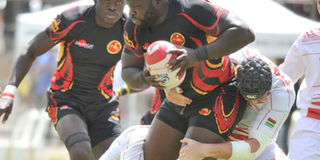Long road ahead as Uganda looks to make Tier 1A its home

Tchumcam of Uganda in action against Mauritius on Wednesday. Photo by Ismail Kezaala
Sporting outfits cycle regularly between boom and slump. The cyclical nature is such that sustained success is followed by lean times or vice versa.
Uganda’s national 15s rugby team is no exception having itself produced a virtuous circle.
Between 2006 and 2012, the Rugby Cranes were the undisputed top dogs in Rugby Africa’s Tier 1A. They would then go on to spectacularly plumb the depth, and had a structural adjustment by Rugby Africa to thank for not being relegated to Tier 1C last year.
As your columnist punched out this piece, Rugby Cranes were on the cusp of rejoining Tier 1A. They needed a win over Botswana to not only confirm their return to the big time, but also come full circle.
It was back in 2002 that Rugby Cranes outfoxed Botswa-na 56-07 on home soil in the Rugby Afrique Tier 1B final.
When Henry Rujumba passed away in such distressful circumstances early this year aged just 39, memories of the 2002 Rugby Afrique Tier 1B tournament were rekindled.
Rujumba bestrode the tournament like a colossus. He showed such extraordinary ball carrying skills. His lock pairing with Gerson Onono is still spoken of stratospherically.
Uganda’s record try scorer, Allan Musoke for one says the pairing has no equal. Musoke, who played in the 2002 Tier 1B tournament and went on to become an African champion five years later, also believes Uganda has the players to make the top division its home.
There is a caveat, though. “We need,” he says, “to work very hard, grow stronger, and keep fitter to stay up”.
But with Rugby Africa having rang the changes and come up with a Mark II of the Tier 1A tournament (it’s now played on a home and away basis), there can be no certainties.
Herbert Wafula, who captained Uganda to the Tier 1B title in 2002, and now heads the Uganda Rugby Union High Performance Unit was under no illusions when sounded out about the new format.
The format, he said, “vomits its own.” By that he meant that a baptism of fire awaits newly promoted teams.
He added: “In order to to have a chance to stay up, crazy preps must start now, and we must get a serious S&C (strength and conditioning) programme.” The blooding of Pius Ogena and Gerald Sewankambo into the Rugby Cranes should also be an eye opener to the rewards of not giving age grade rugby a tattered cushion.
Players like Martial Tchumcam, Alex Mubiru, Mathias Ochwo and Scott Olouch will have to be gradually be phased out of the Rugby Cranes setup by 2018 (when qualifiers for the 2019 World Cup will be played on a home and away basis).
This can only happen if the conveyor belt of the rugby factory has not gone silent.
The introduction last year of an under-19 category in the Elgon Cup was a step in the right direction. But it already looks stillborn after financial bottlenecks saw Kenya ask that it be shelved this year.
Reawakening it from what one can only hope is a slumber is vitally important if Ugandan rugby wants to experience more boom than slump.
Goals fail to earn Herman Wasswa acceptance at home
It’s a sun drenched afternoon at Kyamate Ground in the idyllic Ntungamo, and Abdallah Mubiru’s husky voice is being drowned by a cacophony of vuvuzelas. “Herman! Herman!” Mubiru bellows, streak of veins capturing his seriousness.
He has a mosaic of ideas to share with his striker. Herman Wasswa, though, is either impervious to his coach or has little time to listen to his pitch. He instead stares in another direction, and tries his uttermost to exude tough passion.
The slopes of Wasswa’s face might have been the very embodiment of determination, but we also know that there was a tinge of resentment that bordered on anger. Not to-ward Mubiru but the institution that is KCC FC.
Having let his contract come marginally close to running out, KCC FC had started en-gaging Wasswa with the goal of extending his stay at the Philip Omondi Stadium. There was just one problem, though.
Wasswa wanted what KCC FC thought was an astronomical sign on fee -- $10,000. With both parties holding their ground, Wasswa took to the neat Kyamate Ground in the knowledge that the end was nigh. His goals had not earned him the respect he strongly thought he deserves.
Days after KCC FC lost the Uganda Cup final (a sequel of the anticlimax in Ntungamo) to rivals SC Villa, it was confirmed that Wasswa was leaving on a free transfer. He has since joined Sam Timbe at Sofapaka in Kenya, and wasted no time in finding the onion bag during his debut on Tuesday.
It may be early days, but KCC FC’s decision to let Wasswa run out his contract cannot be likened to Bobby Fischer sacrificing his queen against Donald Byrne in the so-called chess game of he century in 1956. Put simply, it doesn’t look like a master stroke, Shaban Kondoa’s rich vein of form notwithstanding.
Yet life goes on.
Herman Wasswa carries the weight of history especially since he has made it himself as the one of the fastest players to the 50-goal mark in the Ugandan topflight league.
He needed just 90 games to reach the landmark. Wasswa’s goals reel is highly impressive, and includes returns of a goal per two games at KCC FC (26 in 55), SC Villa (20 in 38) and Masaka LC (12 in 18).
People may have cheered his goals raucously, but this hasn’t insulated him from the toxicity of the blend of joy and absurdity.
It seems improbable — even insane — that the jury would still be out on a striker of Wasswa’s calibre. Since Andrew Mukasa and Hassan Mubiru’s powers waned, the Ugandan topflight league has been less hospitable to strikers.
Well, until Wasswa popped up. This wellspring of goals hasn’t gotten that much affection from coaches. Cranes coach Milutin ‘Micho’ Sredojevic recently described Wasswa as the one of the most lethal strikers in Africa, but the fact that the Serb is yet to cap him makes for a dramatic irony.
While at Villa, Mike Mutebi obstinately opted to play Wasswa on the wing and not as the target man.
The role of a striker has evolved over the years.
It’s no longer pigeonholed as a goals or nothing. To lead the line, one has to play well with their back facing the goal. They also have to learn to manoeuvre in tight spaces. Wasswa has struggled on both fronts. May-be Timbe will help him to be a little more continental. Just maybe.
What we now know....
We now know that Emma Okwi has not only recently jumped the broom (i.e. walked down the aisle), but also taken a leap of faith by swapping the Tanzanian Premier League for Denmark’s Superliga.
We know that Okwi’s wedding band was not visible as his left hand held out the sky blue jersey with white sleeves of Danish topflight league club SønderjyskE Fodbold and right hand was gripped by HJ Haysen.
The wedding band though could play a vital part as the striker, not for the first time, at-tempts to have a crack at professional football. We know that attempts to join the paid ranks in Austria (Red Salzburg) and Tunisia (Étoile du Sahel) have previously fallen flat on the face.
We know that Sir Alex Ferguson used to urge his players to jump the broom in the knowledge that it had a ripple effect on their playing careers. Will marriage help Okwi mature and ultimately muster playing professional football in Europe? We can only hope it will.




